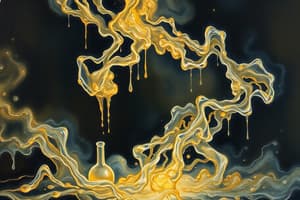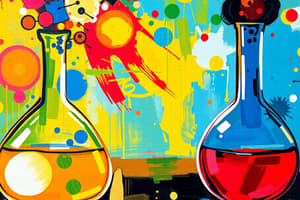Podcast
Questions and Answers
What type of reaction involves two or more reactants combining to form a single product?
What type of reaction involves two or more reactants combining to form a single product?
- Combination Reaction (correct)
- Single Displacement Reaction
- Decomposition Reaction
- Neutralization Reaction
What characterizes a double displacement reaction?
What characterizes a double displacement reaction?
- Ions of two compounds exchange places (correct)
- Electrons are transferred between substances
- Substances combine with oxygen
- An acid reacts with a base
In which type of reaction do two compounds exchange ions in an aqueous solution?
In which type of reaction do two compounds exchange ions in an aqueous solution?
- Combustion Reaction
- Double Displacement Reaction (correct)
- Decomposition Reaction
- Single Displacement Reaction
Which reaction is characterized by a substance combining with oxygen to release energy?
Which reaction is characterized by a substance combining with oxygen to release energy?
What is released during a combustion reaction?
What is released during a combustion reaction?
What type of reaction occurs when an acid reacts with a base?
What type of reaction occurs when an acid reacts with a base?
What product is formed in a neutralization reaction?
What product is formed in a neutralization reaction?
What is the result of a decomposition reaction?
What is the result of a decomposition reaction?
What type of reaction involves the transfer of electrons?
What type of reaction involves the transfer of electrons?
In a double displacement reaction, what is exchanged?
In a double displacement reaction, what is exchanged?
Flashcards are hidden until you start studying
Study Notes
Types of Reactions in Chemistry
-
Combination (Synthesis) Reactions:
- Two or more reactants combine to form a single product.
- Example: 2H2 + O2 → 2H2O.
-
Decomposition Reactions:
- A single compound breaks down into two or more simpler substances.
- Example: 2H2O2 → 2H2O + O2.
-
Single Displacement (Replacement) Reactions:
- One element replaces another in a compound.
- Example: Zn + 2HCl → ZnCl2 + H2.
-
Double Displacement (Replacement) Reactions:
- Ions of two compounds exchange places in an aqueous solution, forming two new compounds.
- Example: Na2SO4 + BaCl2 → 2NaCl + BaSO4.
-
Combustion Reactions:
- A substance reacts with oxygen, releasing energy as light and heat.
- Example: CH4 + 2O2 → CO2 + 2H2O.
-
Neutralization Reactions:
- An acid reacts with a base to produce a salt and water.
- Example: HCl + NaOH → NaCl + H2O.
-
Redox (Oxidation-Reduction) Reactions:
- Involve the transfer of electrons between substances, altering their oxidation states.
- Example: 2Mg + O2 → 2MgO.
Key Points
- Understanding these reactions is essential for grasping chemical processes.
- These types of reactions are frequently demonstrated in experiments within the curriculum.
Studying That Suits You
Use AI to generate personalized quizzes and flashcards to suit your learning preferences.




